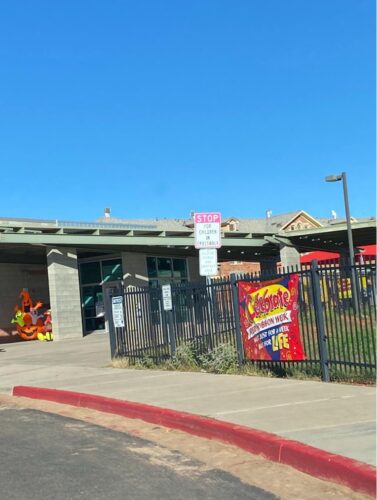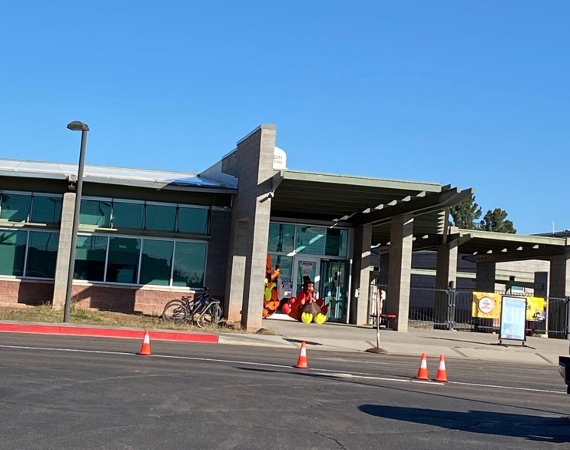In late 2022, when our Director of U.S. Programs, Renée Kube, was getting the chance to visit our affiliated sites again after two years, she found that many of them, especially in the Navajo Nation region of the country, were still adjusting since the pandemic. Although for Renée it meant restrictions on seeing children in the schools, it didn’t deter her from having much-anticipated meetings with our volunteer coordinators, and getting to see the schools in person after a few years of not traveling.
Today, we hear from Renée about her trip to Tuba Boarding School in Arizona, where she got a better idea of how administrators and students are adjusting to new rules and regulations regarding the handling of COVID-19.
Today, we hear from Renée about her trip to Tuba Boarding School in Arizona, where she got a better idea of how administrators and students are adjusting to new rules and regulations regarding the handling of COVID-19.
Hearing from Renée
“Tuba City Boarding School is named after the city in which it is located, which is a hub for business and connections across the reservation. As I approached the main office, I could see colorful Halloween decorations, which I’m sure the children enjoyed. A banner hung on the fence announced Red Ribbon Week. This is the largest drug and alcohol awareness and prevention program in the country, sponsored by the National Family Partnership. The children wear red ribbons and distribute them to family members, and also participate in activities ranging from essay and poster contests, to decorating school doors, to fun runs and more,” said Renée.
“After I signed in, the receptionist ushered me into a meeting room. I was shortly joined by our volunteer coordinator, Valli; her assistant, Elvira, and the principal, Mr. Coffland.”

Tuba Boarding School exterior view
“Tuba City Boarding School has a very old and established affiliation with Children Incorporated. The boarding school was established in 1898. It was moved twice before finding its permanent site in 1901. From its beginnings through the 1940s, the boarding school was operated by the U.S. Army. After that, it came under the direction of the Department of the Interior, Bureau of Indian Affairs (BIA). Some of the old buildings are still in use. There is a growing awareness of the abuses and injustices that many Native American children experienced in the BIA boarding school system, but this is not addressed on the school’s web site. The community may recognize that the boarding schools did harm in the past, but at present, they also serve a purpose that many parents need and value for their children’s education and welfare,” explained Renée.
Home of the Thunderbirds
“This is also one of the largest schools we serve in the United States. The enrollment is about 1,135 children in grades DK (developmental kindergarten for ‘young five year olds,’ with birthdays from June through December) through 8th grade. The DK offers structured learning opportunities, but at a slower pace that includes more play and rest times than regular kindergarten. The school’s demographics are 100% Native American from 100% low income families. The school is divided into ‘educational thirds’: Little Thunderbird Academy for pre-kindergarten to 2nd grade; Rising Thunderbird Academy for 3rd to 5th grades; and Thunderbird Academy for 6th through 8th graders.”
“At present, the majority of the children are day students. In part due to the pandemic and worries about spreading the virus in close proximity, the residential hall’s enrollment has declined to just 20 children. Mr. Coffland was able to use some of the federal pandemic grants to implement some badly needed improvements in the dorms, primarily to the HVAC and the bathrooms. There is also a new playground. And the athletic fields were improved with new sod and a sprinkler system. He feels these improvements will make the residential hall a more attractive option for parents who are deciding where to enroll their children who need a residential facility during the week as well as schooling,” said Renée.
Thanks to their sponsors, children at Tuba Boarding School are receiving much-needed support throughout the year.
“Our meeting opened with the principal stating the school’s pandemic policy included no visitors beyond the reception area. In their ongoing efforts to stop transmission of the virus, visitors could not have contact with students, nor could they go into the classrooms or dorms. Mr. Coffland explained he is being extremely cautious and is trying to keep the children in school and healthy, as well as protect their families.”
“During our meeting, Valli also shared that Elvira, who had formerly helped only with shopping trips, is now doing more. Mr. Coffland then said that Elvira will be a big help to Valli in the upcoming school year, and that the two of them should be able to begin enrolling more children. All three expressed their appreciation for our organization and all of our sponsors,” explained Renée.
***
How do I sponsor a child with Children Incorporated?
You can sponsor a child in one of three ways: call our office at 1-800-538-5381 and speak with one of our staff members; email us at sponsorship@children-inc.org; or go online to our sponsorship portal, create an account, and search for a child that is available for sponsorship.

